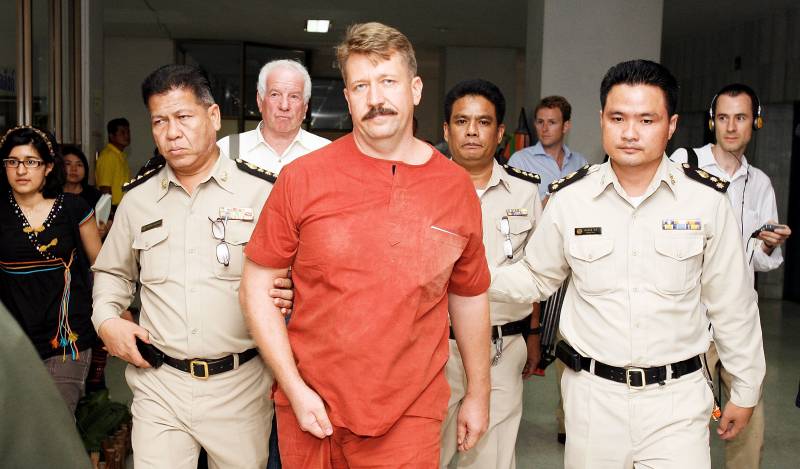On Thursday, the U.S. freed Bout in an exchange for U.S. basketball star Brittney Griner, who has been held in Russia for the past 10 months. The Biden administration also was seeking to free another imprisoned American, Paul Whelan, but he was not part of the swap and remains jailed in Russia.
Bout was in his mid-20s when the Soviet Union fractured in 1991, leaving vast quantities of Soviet military hardware scattered across 15 newly minted countries. Most all of them were ill-equipped to pay their troops or keep track of the weapons they'd just inherited. Almost anything was available for a price.
Trained by the Soviet military as a linguist, Bout began acquiring Soviet military transport planes and loaded them up with weapons. The U.S. says he sold them all over the world. Various reports linked him to wars in Afghanistan, Angola, Congo, Lebanon, Somalia, Yemen and more.
He was entrepreneurial, not ideological, selling to governments that were fighting rebels, and to rebels who were fighting governments. Separating fact from fiction has often been difficult when documenting Bout's work, but many reports said he even sold arms to both sides in the same conflict.
Bout always denied he was selling weapons, claiming he was flying flowers and frozen chickens to some of the world's most violent places.
He was always hard to pin down, but he lived openly in Moscow, traveled widely, occasionally spoke to reporters and seemed to welcome at least some of the attention. He became so notorious that Hollywood made a 2005 movie loosely based on his life, called the Lord of War, starring Nicolas Cage.
Bout was nicknamed "The Merchant of Death," which was also the title of a biography.
Despite facing international sanctions and threats of arrest, Bout managed to stay a step ahead of law enforcement until 2008, when he was captured in a sting operation in Thailand, organized by the U.S. Drug Enforcement Agency.
The Thais extradited Bout to the U.S. two years later, where he was charged with conspiring to kill Americans. He was convicted in a Manhattan court in 2011, and received a 25-year sentence that he was serving in Marion, Ill.
The Kremlin's angle
So why did Russian leader Vladimir Putin want to bring Bout back?
After all, he made his money selling weapons that had been intended for use by the Soviet Union's military and successor countries.
When CIA director William Burns was asked this question in July at the Aspen Security Forum, he said succinctly: "That's a good question, because Viktor Bout's a creep."
Dan Hoffman, a former CIA officer who served in Russia, said Putin's motives should be viewed through the lens of his ongoing battle with the U.S.
"Every opportunity he gets, Vladimir Putin wants to show that he can go toe-to-toe with Russia's main enemy," Hoffman said. "It's a real good public relations move for him to show that he's taking care of his own."
The U.S. and Russia have a history of working out deals to gain the return of their own citizens. In April, the U.S. released a Russian pilot convicted of conspiring to bring drugs into the U.S., and Russia freed Trevor Reed, a former Marine who'd been convicted of assaulting a Moscow police officer.
More commonly, the countries kicked out suspected spies in tit-for-tat deals.
But the current negotiations appear uneven in some respects. The U.S. would be freeing a convicted arms smuggler who operated on an international scale for close to two decades.
Meanwhile, Secretary of State Antony Blinken said earlier this year that the two Americans, Brittney Griner and Paul Whelan had been "wrongfully detained and must be allowed to come home."
Griner, 32, is the pro basketball star who has pleaded guilty to having hashish oil in her suitcase at a Moscow airport in February. Whelan, 52, a former Marine who traveled openly to Russia for years, was arrested in 2018 and convicted on espionage charges in a secret trial.
Limited options
Dan Hoffman said this summer that he supported the efforts to win the release of the Americans.
"These are dirty deals, but there's two bad options," he said. "One is letting American citizens get sick, and potentially even worse, in jail. And the other one is make essentially a dirty deal. If it's me, I'll get my U.S. citizens out."
Back in July, Blinken said he had presented a plan to Russia for the return of two Americans, though he did not mention Bout by name. The Russians were initially cool to the offer in their public statements, but showed signs of interest in the deal more recently.
A U.S.-Russian prisoner swap signals the two countries can still do business on some level despite the terrible state of relations and the backdrop of the war in Ukraine, where the Americans are the leading arms supplier to the Ukrainians.
But analysts say there's no real prospect that the overall atmosphere — which has been going from bad to worse — is likely to improve.
Greg Myre is an NPR national security correspondent. Follow him @gregmyre1.

9(MDAxOTAwOTE4MDEyMTkxMDAzNjczZDljZA004))
